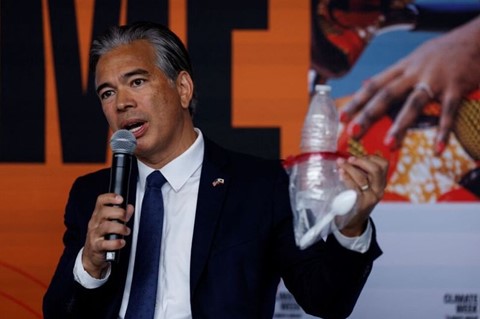
California Sues Exxon Mobil for Role in Global Plastic Pollution
On Monday, California, along with several environmental groups, filed a lawsuit against Exxon Mobil, accusing the company of contributing to global plastic pollution through decades of misleading practices. California Attorney General Rob Bonta, speaking during Climate Week in New York City, announced that the lawsuit follows a nearly two-year investigation into Exxon's actions. According to Bonta, the investigation revealed that Exxon misled the public about the true limits of recycling, exacerbating the plastic waste crisis.
"This lawsuit presents the most comprehensive account yet of ExxonMobil's long-standing deception. We are calling on the court to hold Exxon fully accountable for its role in perpetuating and worsening the plastics pollution crisis," Bonta said in a statement.
The investigation draws parallels with earlier probes into the oil industry's alleged efforts to deceive the public about climate change, which California is also pursuing legally. The state's conflict with Big Oil has deepened over time, particularly as California's oil production has steadily declined due to a challenging regulatory environment.
Exxon's competitor, Chevron Corp, which has frequently criticized California's regulations, announced plans to relocate its headquarters from the state to Texas, which is considered more favorable for the oil industry.
A coalition of environmental organizations, including the Sierra Club, joined California's legal fight, filing a similar lawsuit in a San Francisco court that makes comparable claims against Exxon. Bonta's office is particularly focused on Exxon's promotion of its "advanced recycling" technology, which involves using pyrolysis to convert hard-to-recycle plastics into fuel. Bonta pointed to the slow progress of this technology as further evidence of Exxon's ongoing deception. He aims to secure civil penalties and an abatement fund to address the harm caused by plastic pollution in California.
Exxon, however, dismissed the accusations. A spokesperson for the company argued that advanced recycling is a legitimate solution and criticized the lawsuit as being more about generating headlines than solving the issue of plastic waste. "Advanced recycling is a real solution," the spokesperson said, adding that California has done "nothing to ‘advance' recycling."
Despite the lawsuit, some experts believe California faces a tough challenge. Bruce Huber, a law professor at Notre Dame specializing in environmental issues, commented that the case, which hinges on public nuisance law, might be difficult to win. He warned that if California succeeds, it could open the door to a wave of similar lawsuits.
Exxon Mobil is the largest producer of resins used in single-use plastics, according to a report by the Minderoo Foundation. The plastics industry has long promoted advanced recycling as a key environmental solution, though many remain skeptical about its effectiveness.
California's lawsuit comes just before the final round of negotiations for a global treaty on plastic pollution, set to take place later this year in Busan, South Korea. These talks have seen divisions over whether the treaty should include caps on plastic production—something opposed by Exxon and the broader petrochemical industry. The U.S. recently expressed support for a treaty focused on reducing plastic production worldwide.
Environmental advocates applauded the lawsuit, with Christy Leavitt from Oceana stating that it would "hold the industry accountable and debunk the false recycling narrative that prevents us from finding real solutions."